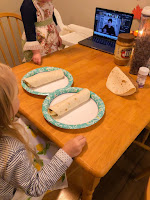Interview with Yuliya
Warner: “When Directing a small church school, be excited and stay flexible!”
Yuliya
has served as Sunday Church School Director at St. Anthony Antiochian Orthodox
Church (Melbourne, FL) for six years. She was also the primary teacher for the
program. Students meet in the same classroom and share a lesson, with an
average attendance of 2-8 children per Sunday.
Which curricula is used for Sunday classes?
I use
Orthodox Christian Education Commission materials as a base, along with various
online resources to create my own lessons, since at times the students range in
age from 4-17 years old. In addition, I occasionally use the Sunday Gospel for
Children from Let Us Attend on the Department of Christian Education website (I
add it to the bulletin with either a crossword puzzle or coloring page).
How do you organize a lesson that works well for
all ages since you don’t know in advance which ages of students will be
attending on any given Sunday?
I
prepare for all ages just in case. We have a computer and printer available at
our church, so if something unexpected comes up I can quickly adjust and print
more materials. Also, I always keep various craft materials in our classroom.
Please
describe one or more of the ways that you communicate with parents about Church
School so that they feel connected even if their children are not able to
attend on some Sundays.
We
connect by email, text, or phone call. I email links with our weekly news
announcements (I do “St. Anthony’s News” email on Sunday and the weekly
bulletin, so I can add Sunday school news and materials to it). For the
Creative Arts Festival, if children are not there for a period of time, I mail
materials with a prepaid return envelope (this works better than just emailing
a link for Creative Arts Festival to the parents).
Please
describe a Church School event that happened outside of church.
All the kids
were invited for a trip to the zoo. All costs were covered by the Sunday school
fund. We had only two kids (ages 4 and 12) and one parent. Our theme for the
trip was the beauty and wonder of God’s creations. We fed a giraffe, saw
wonderful animals, and got to explore nature. We took a short break to share
food (I had a cooler with food and drinks). Fr. Elia joined us for lunch and
led us in prayer before the meal. We sat on the rocking chairs by the lake,
watched the fish and birds, and talked about life. There is a lot to say about
our trip. It was so much fun! I love field trips because they help us to get to
know each other better. At the end, we had even more fun running to the car in
the rain. The feeling of togetherness and friendship is the best!
What
advice do you have for directors who are building church schools in small
parishes?
There is
no formula, but I would say don’t get discouraged, stay excited, be flexible,
and make more community events to show what you have to offer. People move constantly,
so try to keep in touch with kids who left. Let them know that they have a home
at your church and that they are loved by their church family. Also, work
together with your priest to further improve church schools.
What is
a short-term goal that you have for St. Anthony Church School?
The
attendance is very inconsistent, so it is difficult to make plans. I would like
to have a computer in our classroom to engage my students and increase
participation.
Church
School activities outside the classroom:
Camp
days: Fr.
Elia and I make three camp days throughout the school year. First, we come up
with a theme. For example, our last theme was “Priest’s Vestments”. Next, he
prepares a conversation about it. Sometimes I send him my ideas and links to
look at. During camp, we pray in the morning, have breakfast together, then go
in for Abouna’s talk, and do some Q&As. After the talk, I have a
conversation with the kids about Father’s speech while making a themed craft or
poster. We show our creations on Sunday to the whole parish by putting it on
our bulletin board.
Field Trip: Fr. Elia and I always make sure to plan at least one field
trip during summer.
Christmas play: We do a Christmas play every year. Sometimes just kids,
sometimes with the whole parish (whoever wants to participate). I usually
conduct the play, but anyone can give advice, help with music, costumes, props,
or suggest text for the play (which I often alter to fit our small parish).
St. Ignatius Dinner and Special Olympics Fundraiser: We organize a
luncheon with kids and parents to raise money.
Holiday celebrations: I ask children, teens and parents to get involved
with cooking and decorating for holiday events.
Angel Tree: In November, children, with help from the adults, decorate
our Christmas tree for the Salvation Army angels. After that is over and gifts
are delivered, we decorate it for Christmas. I try to get all of our children,
big and small, involved in the life of our Church.
Feast Day Lessons: Every week before a Feast day, I put together a
lesson to educate the children about certain details to pay attention to during
the service. We usually cancel Sunday school for Feast days, so children can
witness and learn our traditions and services. I am usually involved in
organizing Feast celebration luncheons, so I ask the children to help with
flower arrangements, setting up tables, and decorations.
In our small Church there is always enough work for everyone. Participating in
all activities teaches children to love one another, be attentive, and serve
God by serving others. We are a Church Family.













